Risk
The CALP Network’s State of the World’s Cash report found that the perception that CVA is riskier than other forms of aid was one of the main barriers to CVA being routinely used. This concern is linked to the growing emphasis from donors on anti-terrorism and money laundering, and shrinking budgets for humanitarian assistance. The CALP Network’s work under this theme aims to debunk myths, facilitate collaboration, and share learning to ensure that CVA is systematically and equally considered, based on evidence of actual risks across modalities.
Current priorities
A variety of organisations are currently working on CVA and risk. The CALP Network is working to identify synergies among actors, avoid duplication, and define joint priorities that can be better addressed collectively. Together with WFP, the CALP Network is co-leading the risk priority within the Grand Bargain workstream on cash.
Featured content

Podcast: Will risk aversion hold us back from realizing the potential of CVA?
Podcast
Episode 1 of the CashCast, exploring how attitudes to risk have impacted the use of CVA in the Middle East and North Africa region.

CVA and Risks: What happens in the field, stays in the field?
Blog Post
In October 2019 in Douala, Cameroon, the CALP Network facilitated a learning event exploring the risks to beneficiary protection in Cash and Voucher Assistance (CVA). This closed-door workshop, held as part of series of meetings and webinars on theme of CVA and risk in different regions, convened 25 humanitarian workers from West and Central Africa representing local and international NGOs, UN...

Webinar: Data sharing in CVA: ethics, ownership and privacy
Event
Thematic lead
Latest

Libya Cash and Markets Working Group (CMWG) Advocacy and Communications Plan
Report
The Libya Cash & Markets Working Group (CMWG) Strategic Framework & 2017 Workplan outlines ‘communication and advocacy’ as a ‘deliverable’ for supporting ‘HC/HCT decision making’.
Throughout March & April 2017, the CMWG Steering Committee used a series of tools as part of a seven-step process...

Conflict-sensitive Cash Transfers: Unintended negative consequences
Report
Risks associated with cash transfer programmes in fragile contexts include theft, diversion, corruption, security, targeting, misuse by beneficiaries and inflationary effects. However, the literature indicates that – while different – these risks are no greater than those associated with other forms...
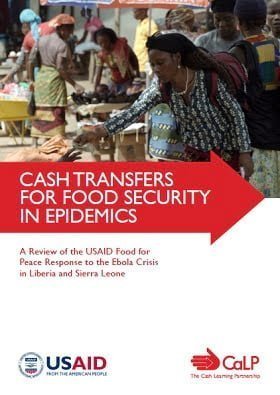
Cash Transfers for Food Security in Epidemics
Report
The report is divided into five chapters. The introduction provides a brief overview of the study’s objectives, data collection methods and a snapshot of the context in Liberia and Sierra Leone. The second chapter describes USAID/FFP’s response to the Ebola crisis with a particular focus on CTP....
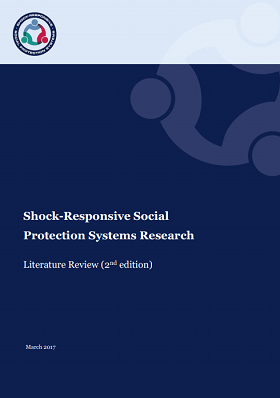
Shock-Responsive Social Protection Systems Research: Literature Review (2nd Edition)
Report
DFID has commissioned research into Shock-Responsive Social Protection systems, to further understand the nature of the interaction between social protection, humanitarian and disaster risk management systems and ways in which long-term social protection systems can be scaled up to provide support in...

Managing Cash-Based Programmes in a Volatile Markets Contexts: The Case of Delivering Cash Using Mobile Money During the Zimbabwe Cash Liquidity Crisis
Report
This case study examines how the Zimbabwe national cash crisis evolved and the ways in which affected communities and the CTP adapted to the challenges it posed. The study highlights what worked well, what was less effective, and some other possible future opportunities. It also provides operational...
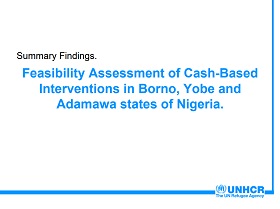
Feasibility Assessment of Cash-Based Interventions in Borno, Yobe and Adamawa states of Nigeria
Report
Outputs
• Analyse the feasibility and available response options for
potential CBIs covering basic needs, livelihoods and
support to vulnerable persons, and moving forward
toward MPGs
• Recommendations and action points……
• Support the Design of a CBI intervention and develop SOPs (2017)
•...

Cash Delivery Mechanism Assessment Tool
Guidelines and Tools
In line with its commitment to institutionalise the use of Cash-Based Interventions (CBIs), the office of the United Nations High Commissioner for Refugees (UNHCR) released the Operational Guidance for Cash-Based Interventions in Displacement Settings (“the Guidelines”) dated 4 February 2015, to...

Cash or in-kind? Why not both? Response Analysis Lessons from Multimodal Programming
Report
This research reviews lessons learned about response analysis from multimodal responses, that is, responses in which practitioners determined that more than one response modality between cash,vouchers, and in-kind, was a “best fit” or in which the conclusions about “best fit” changed over...

Cash alone is not enough: a smarter use of cash
Guidelines and Tools
Cash based interventions (CBIs) enable crisis affected people to make choices and prioritise their own needs. They also support markets critical to survival and recovery of communities. NRC is committed to increasing the use of cash across its programmes. Yet, cash based interventions are not a...

The Impact of Cash Transfers on Women and Girls
Report
This briefing summarises the findings on the impacts of cash transfers on women and girls. These are drawn from a rigorous review of the evidence looking at the impacts of cash transfers across six outcome areas (Bastagli et al., 2016). The review covered literature spanning 15 years (2000–2015). It...
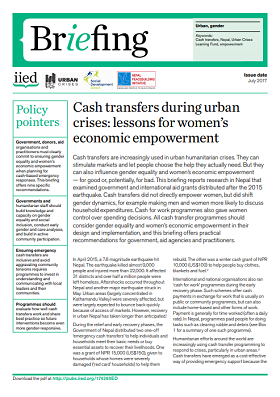
Cash Transfers During Urban Crises: Lessons for Women’s Economic Empowerment
Guidelines and Tools
Cash transfers are increasingly used in urban humanitarian crises. They can stimulate markets and let people choose the help they actually need. But they can also influence gender equality and women’s economic empowerment — for good or, potentially, for bad. This briefing reports research in Nepal...
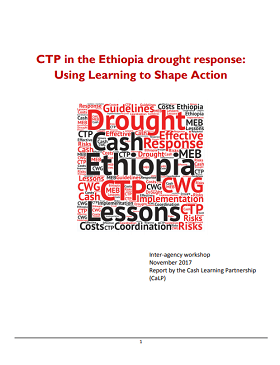
CTP in the Ethiopia Drought Response: Using Learning to Shape Action
Report
This workshop, convened by the CALP Network and the Ethiopia Cash Working Group, reflected on the use of cash transfers in the 2017 drought response. Key findings were: Cash helped address immediate needs and contributed to meeting some of the drought response objectives. There were significant...

Enacting urban cash for work programmes in Lebanon in response to the Syrian refugee crisis
Guidelines and Tools
Humanitarian crises in cities require responses that reflect the urban context,address urban challenges, and provide urbanised solutions. This paper focuses on providing guidance on good practice in cash for work (CfW) programmes. Focusing on Lebanon and the Syrian refugee crisis, the paper provides nine...

Checking Back – Using Cash and Vouchers in Somalia: Recommendations from the 2011-12 Somalia Drought Response
Report
This paper brings together recommendations from some of the key reports and evaluations from the 2011 Somalia drought response. The process of preparing this paper involved reviewing 17 reports and identifying five that had recommendations which could be useful for all agencies involved the current...

Real time evaluation report for Kenya Red Cross Society
Report
After launching of its first Drought Emergency Appeal, Kenya Red Cross Society undertook a real time evaluation of its cash transfer response in May 2017 to find out what was working or not working in the KRCS emergency cash transfer response to enable decision making in the remaining period of the...

Using Cash and Vouchers in Somalia in 2017: The Need to Build on Learning from the 2011-12 Somalia Drought Response
Report
During the 2011-12 drought response in Somalia, cash and vouchers were distributed at scale – a response that was unusual in such a context at that time. In 2017 cash is accepted as highly appropriate and is a major part of response plans. While it may not always be possible to apply all best...
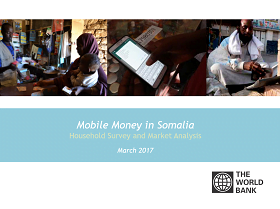
Mobile Money in Somalia – Household Survey and Market Analysis
Report
Key findings from an assessment of mobile money in Somalia. Provides information about mobile money penetration; practicalities; usage; perceptions and the use of shillings versus dollars.

The Role of Financial Services in Humanitarian Crises
Guidelines and Tools
More than 75 percent of adults who live in countries that are coping with humanitarian crises remain outside the formal financial system. Financial inclusion would provide both refugees and residents with a diversified set of financial products (including savings, remittances, credit, and insurance) that...

Is cash better than food vouchers for Syrian refugees?
Report
A comparative analysis of the effectiveness of unrestricted cash and food restricted voucher assistance modalities for Syrian refugee households’ food security in Jordan and Lebanon.

ELAN Humanitarian KYC Case Studies
Report
Know Your Customer (KYC) regulations, also known as customer due diligence, are designed to combat money laundering, terrorist financing, and other related threats to the financial system. They refer to the ID checks that financial institutions perform to comply with national financial regulations....



